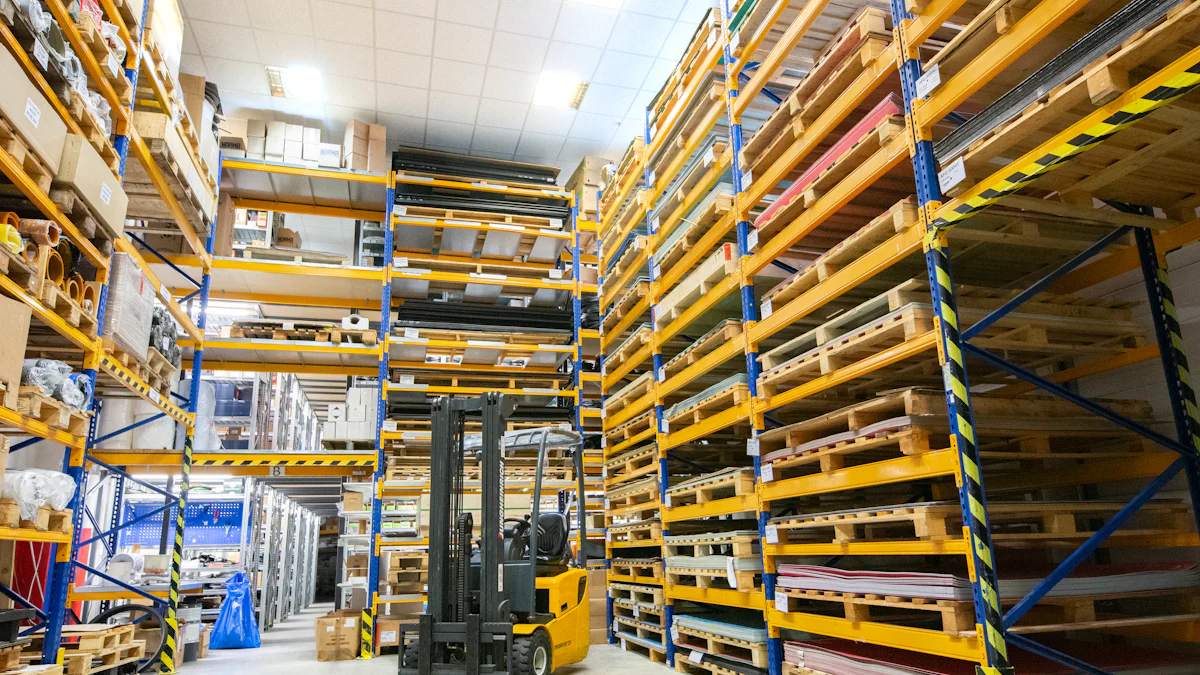Top 10 Logistics Technology Trends to Watch in 2024

In 2024, the logistics industry is at a crucial point, where logistic technology plays a vital role in shaping the future of supply chain operations. With a focus on improving efficiency and meeting changing consumer demands, adopting state-of-the-art technologies has become essential for logistics companies. The top trends highlighted in this article indicate a notable move towards automation, digitalization, and sustainability. These trends are not just progressions but drivers of significant changes within the industry.
Cyber Extortion
Logistic technology faces a growing threat from cyber extortion schemes. Recent incidents like the SolarWinds Cyber Attack and the Kaseya Ransomware Attack highlight the risks of supply chain vulnerabilities. These attacks inject backdoors into software updates, leading to data breaches and security incidents across corporate and government servers. To combat these rising threats, companies must prioritize cybersecurity measures to safeguard their operations.
Supply Chain Data Governance
Data Accuracy
Ensuring data accuracy is paramount in supply chain operations. Precision in information leads to informed decision-making, reducing errors and enhancing overall efficiency.
Compliance Requirements
Meeting compliance requirements is a crucial aspect of data governance. Adhering to regulations and standards ensures ethical practices and builds trust with stakeholders.
Implementation Strategies
Implementing robust data governance strategies involves establishing clear protocols, assigning responsibilities, and leveraging advanced technologies for seamless integration.
End-to-end Sustainable Supply Chains
Sustainability Goals
Implementing sustainable practices in supply chains is crucial for reducing environmental impact and promoting economic benefits.
Enhancing sustainability goals leads to positive outcomes for both the environment and financial performance.
Environmental Impact
By focusing on reducing carbon footprint and waste generation, companies can contribute to a healthier planet.
Sustainable supply chains play a key role in preserving natural resources and minimizing ecological harm.
Economic Benefits
Embracing sustainability can result in cost savings through optimized processes and resource management.
Companies that prioritize sustainable practices often experience increased profitability and long-term growth opportunities.
AI-Enabled Vision Systems
Applications in Logistics
Inventory Management: Enhancing operational efficiency, AI-enabled vision systems streamline inventory tracking and management processes. These systems accurately monitor stock levels, reducing errors and optimizing warehouse space utilization.
Quality Control: Ensuring product quality, AI-driven vision systems conduct real-time inspections to identify defects swiftly. By automating quality control processes, companies can maintain high standards and meet customer expectations.
Future Developments
AI-enabled vision systems are advancing rapidly in logistics. The integration of machine learning algorithms enhances recognition capabilities, enabling these systems to adapt to dynamic environments efficiently. The future holds innovations in image analysis techniques for even more precise object identification and classification.
Augmented Connected Workforce
Enhancing Workforce Efficiency
Training and Development
Implementing training programs enhances employee skills and knowledge.
Developing workforce capabilities through continuous learning drives operational excellence.
Upskilling initiatives ensure workforce readiness for evolving industry demands.
Real-time Assistance
Providing real-time support improves decision-making processes.
Offering immediate guidance boosts productivity and efficiency.
Access to instant assistance streamlines workflow and enhances task completion.
Composite AI
Integration in Logistics
Predictive Analytics
Composite AI integrates various artificial intelligence techniques to enhance learning efficiency and broaden knowledge representations. In logistics, predictive analytics plays a pivotal role in forecasting demand, optimizing inventory levels, and improving operational decision-making processes.
Decision Making
By leveraging composite AI in logistics, companies can make data-driven decisions swiftly and accurately. The amalgamation of different AI methodologies enables businesses to analyze complex scenarios, identify patterns, and derive actionable insights for strategic planning.
Future Prospects
Composite AI holds promising prospects for the logistics industry. As technology continues to evolve, the integration of diverse AI capabilities will revolutionize supply chain management by enabling proactive problem-solving, enhancing operational agility, and driving continuous innovation.
Next-Generation Humanoid Working Robots

Applications in Warehouses
Task Automation
Humanoid Robot Digit is a 5-foot-9-inch robot configured to pluck empty yellow bins off shelves swiftly and ferry them to conveyors.
Future Robotics in Warehousing envision robots collaborating with humans, reducing repetitive tasks, and enhancing productivity.
Automated Picking and Sorting Systems streamline warehousing operations, minimizing errors, and enabling strategic focus for employees.
Safety Improvements
Warehouse Automation Solutions aid workers in inventory processes from arrival to departure, boosting accuracy and safety.
Agility Robotics' Humanoid Robot Digit moves bins efficiently from shelves to conveyors, aiming for global deployment.
Machine Customers
Impact on Supply Chains
Automated Ordering
Streamlining supply chain operations, automated ordering systems optimize inventory management processes by efficiently processing orders and reducing manual errors.
Enhancing order accuracy and speed, automated systems ensure timely fulfillment of customer demands, improving overall operational efficiency.
Inventory Management
Implementing advanced inventory management solutions, companies leverage automation to track stock levels accurately and optimize storage capacities.
By integrating machine learning algorithms, inventory management systems forecast demand patterns, enabling proactive adjustments for efficient resource allocation.
Future Trends
In response to the increasing demand for personalized services, future trends indicate a shift towards AI-driven machine customers. These innovative systems are projected to revolutionize supply chains by offering dynamic inventory management capabilities and enhancing order optimization processes. With over 20% of future revenue expected to be driven by machine customers, logistics companies are gearing up to implement efficient importation and exportation strategies while focusing on track & trace functionalities for enhanced visibility across the supply chain network.
Autonomous Vehicles

Self-driving Trucks
Efficiency Gains: Autonomous vehicles streamline transportation operations, optimize routes, and minimize human errors. They lower costs, improve operational efficiencies, reduce delivery times, and enhance fuel efficiency.
Safety Concerns: With navigation and assistive devices, self-driving trucks ensure safer driving practices. Object recognition software benefits last-mile deliveries by enhancing safety measures and reducing risks.
Drones and Delivery Vehicles
Autonomous vehicles in logistics significantly impact distribution centers by lowering costs and delays. Businesses are testing autonomous vehicles for the last mile of delivery to streamline processes. These vehicles reduce fuel consumption, maintenance expenses, and errors while optimizing delivery routes efficiently. UPS has partnered with TuSimple and Waymo to deploy self-driving trucks for transporting packages on specific routes using cameras, lidar, and radar systems for navigation with minimal human intervention.
Blockchain Technology
Enhancing Transparency
Blockchain technology enhances transparency by providing a secure and tamper-proof platform for recording transactions. It ensures trust among multiple parties in the supply chain by creating an auditable record of information flows, inventory movements, and financial transactions. This transparency fosters accountability and integrity throughout the supply chain network.
Secure Transactions
Implementing blockchain technology enables secure transactions within the supply chain ecosystem. The decentralized nature of blockchain ensures that data is encrypted and stored across multiple nodes, reducing the risk of fraud or unauthorized access. Secure transactions promote reliability and trust among stakeholders.
Traceability
Blockchain facilitates enhanced traceability by creating a permanent record of product journeys from origin to destination. This feature allows for real-time monitoring of goods, ensuring compliance with regulations and quality standards. Improved traceability minimizes errors, reduces delays, and enhances overall operational efficiency.
The transformative logistics technology trends in 2024, including automation and robotics, AI, ML, Blockchain, IoT, AR, VR, autonomous vehicles, drones, and digital twins are reshaping the industry. These advancements streamline operations, enhance efficiency, and ensure competitiveness in the market.
Embracing these innovations is crucial for logistics companies to optimize operations and meet evolving consumer demands. Automation technologies like machine vision systems and autonomous vehicles play a pivotal role in reducing errors, improving reliability, and revolutionizing supply chain management.
As technology continues to drive change in logistics operations by increasing customer expectations and focusing on operational strength, it is imperative for businesses to adopt these cutting-edge technologies to stay ahead of the curve.
See Also
Leading Logistics Courses for 2024
Innovative Logistics Tech: Exploring Tomorrow's Advancements
Artificial Intelligence in Supply Chain: Transforming Future Logistics
Enhancing Supply Chain Productivity: 5 Key Trends Ahead
Preparing for Tomorrow: Discovering Cutting-Edge Transport Tech in Supply Chains
